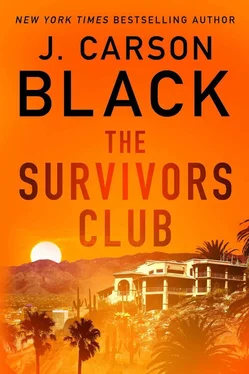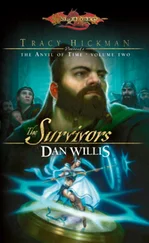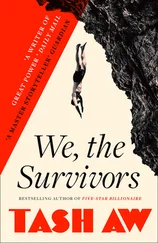Tess could feel the trail narrowing, and it was lined with thorns. “He’s from Judge Rees’s first marriage.”
“Yes.”
Tess cleared her throat. “To the governor’s brother.”
“That pretty much covers it. Judge Rees and her ex are still on very friendly terms, so I hear. And you know her and the governor are like that.” He crossed his fingers. “But that’s not all. She’s a Democrat—‘big D.’ Our boss is not going to like this.”
Tess knew what he meant. The sheriff of Santa Cruz County was influential in party politics—in fact he made sure the party was run like a well-oiled machine. She said, “Her son needs to learn some manners.”
“That may be, but you got to remember we have two political parties in this state. One’s all brains and no principle, and the other is all principle and no brains. But this county is Democrat and this is how the game is played. Barkman’s got a dipshitty little job researching minor crime scenes, which makes his mama happy, and that makes all of us happy. He does the legwork they can’t afford to do, and one hand washes the other. So you see my problem. Now suppose you tell me your side of the story.”
Tess told him.
“Can’t blame you, considering where you were. Hell, just going out there you should get combat pay. I have no problem with what you did, but the sheriff thinks you should send Barkman a written apology.”
Tess felt her stubborn coming on. For a moment she thought about digging her toes in, but in the scheme of things—considering what they were faced with—it wasn’t worth it. “Sure, I’ll send him a note.”
“I’m gonna want to see it when you’re done.”
“Fine.”
“Good.” He leaned back in his chair and started swiveling—something he’d always done when he had something hard to think about. “So what’s your take on this? On Hanley?”
“I’m not sure.”
He rested a cowboy-booted foot over the other knee, clasped his hands over his stomach. Bonny had a bad back, and liked to keep at least one leg up high for relief to his lower spine.
He turned his pale blue eyes on her. “Your theory?”
“I don’t have one yet.”
“You don’t have one yet.”
She cleared her throat. “It has all the earmarks of an execution. Like they made an example of him.”
“They.”
“‘They’ or ‘he’ or ‘it.’ I don’t know what else to call them.”
“So your suspects are everybody and nobody.”
“That sums it up.”
“You think they’re in Mexico?”
“I don’t know, sir.”
“They could be in Mexico. They could be here in the state. I read the report, but I want to hear it in your own words. Tell me what you’ve got.”
Tess went over it for him. Her theory that Hanley was meeting someone. “I doubt someone could sneak up on an ex-cop like that. Plus, the time of day. So late.”
“Doing something illegal,” murmured Bonny.
“Could be.”
A sixty-eight-year-old man who came down here to be near his daughter. A guy who had a dog and liked fishing and kept to himself and was civic-minded enough to belong to a buffelgrass eradication group.
But you never knew about people.
Bonny scratched his head. Dandruff ensued. “You’re telling me that he was, what? Running drugs? Guiding crossers? Gunrunning?”
“His death fits with any of that.”
“But?”
“I can’t see it. At least, it’s hard for me to see it. I suppose the money…I guess anyone can fall prey to that.”
Bonny said nothing.
“Another thing. He had a dog. The same day the dog went to the pound—yesterday—a woman adopted her. Snapped her up. It might not mean anything, but—”
“You can’t be saying you think the dog was evidence in some way? Like he was smuggling drugs in the dog?”
“It’s happened.”
“You believe that’s the case here?”
Tess thought about the man’s credit cards, paid in full every month. His monastic lifestyle. The fact that he gave a large portion of his lottery check to the Humane Society. She thought about the pet products—dog shampoo, doggie treats, prescription diet food, grooming brushes, toys, matching leash and collar.
“No.”
“Where does that leave us?”
“I don’t know. But it looks like somebody wanted to make an example of him.”
Silence.
When Tess was in her late teens, she’d go with her friends to a city park in Albuquerque at night. They’d done the usual things, including ride a teeter-totter in the dark, hang out on the picnic tables, sometimes there were makeout sessions, and once or twice, more than that. Some of them smoking and some of them drinking. Kids at a loose end. They were the only ones in the small park.
And then she’d felt it. Just sitting there on the aluminum seat of the picnic table. She’d felt something dark and menacing brush past them. There was no cold air, but Tess had felt cold inside. It was there. Evil.
She’d looked at the kids she was with. She didn’t know some of them that well. Three males and another female.
But it hadn’t been coming from them. At least she didn’t think so.
It was as if a door had opened and something bad had come through and passed them by.
Tess felt that way now.
“The way things are going, what’s happening these days, is too much,” Bonny said into the silence. “Sometimes I wonder why we bother. Why the Border Patrol keeps rolling that rock uphill. The people in Mexico and the people here—we’re outnumbered and outgunned. Look at Mexico—even the good guys have to become bad guys just to survive. Shit, that’s the norm for down here.”
They sat there, the feeling that they had been enveloped by something bigger than both of them: an evil that was palpable. It was a sunny day outside. Blue sky. Cars in the parking lot, sunlight bouncing off chrome. Heartbreakingly beautiful blue mountains in the distance, blond grassland rising up to them like pale surf.
But they were underwater. They were sinking under a deluge that seemed to spread. The killings. The torture. The burnings. Beheadings.
Obscene.
Tess rubbed her arms, feeling the air conditioning cold on them.
It was just like the park.

Tess typed up what she had and added it to the murder book. She copied the new information to the report that would circulate to her superiors.
She left early. It was time to find out about the rest of George Hanley’s life—the one that seemed so normal. She would start by going over to interview the head of SABEL, a woman named Jaimie Wolfe. Jaimie’s place was on State Route 82 outside Patagonia, where Tess lived.
She stopped at the Circle K on her way out of Nogales, bought an energy bar, and roamed the tabloid racks. This time she saw something new—Max Conroy sharing a split page with an actress in a bikini, the droplets from her dip in the ocean accentuating her beautiful body. One hand held back the dark tangle of her hair and water beaded on her perfect breasts. She had exotic eyes.
The headline said, “Max’s Mermaid?”
The woman’s full name was Suri Riya, but she was one of those stars who went by one name: Suri. Her bikini wouldn’t cover a teacup Chihuahua. Make that two teacup Chihuahuas.
Tess opened the back door to the SUV and dumped the tabloid on top of the others—the Globe , Star magazine, Celebrity NOW —all of them thrown into a cardboard box. One of these days maybe, she’d get around to looking at them.
She drove out onto the highway headed in the direction of Jaimie Wolfe’s place.
CHAPTER 7
Читать дальше













